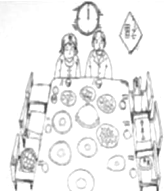题目内容
20.Julie always thought of herself as an easy-going and tolerant person,(61)whoput up with people's differences.She hardly ever became upset about anything,and(62)believed(believe) that if you treated people well,they would cooperate with you.That is,until Alex and Harry moved in next door.At first,when their music woke her at night,she was just a bit (63)annoyed(annoy).She said to herself,"Take(64)iteasy.I make a lot of noise sometimes.I will go round and complain,in as nice a way as possible."When she knocked at Alex and Harry's door,she said."(65)Honestly(honest) speaking,your loud music has bothered me.Do you think you could turn it down a bit?"They just smiled,not(66)feeling(feel) ashamed at all,and then Alex said,"You can think whatever you like,as far as we're(67)concerned(concern)."Then they shut the door in Julie's face.In the following week,the noise continued and Julie felt angry,but was(68)determined(determine)not to lose her temper.Next time she called on next door,she gave Harry and Alex a present."It's just a cake I made(69)foryou.Please accept my sincere(70)apology(apologize) for last time!"And that day the noise stopped."What a relief!"thought Julie."Now there's some peace and quietness and I can read my favorite book."
分析 短文主要讲了Julie与其邻居之间的矛盾,并在最后是如何化解的.
解答 61.who,考查定语从句,句子先行词personal,引导定语从句使用who.
62.believed,考查时态,and连接两个并列谓语,前面became使用的是一般过去时,因此使用一般过去时believed.
63.annoyed,考查形容词,此处指she"感到恼怒的"使用形容词annoyed.
64.it,考查固定搭配,take it easy"放松点".
65.Honestly,考查副词,此处应使用副词修饰speaking,honestly speaking"老实说".
66.feeling,考查非谓语,feel与其逻辑主语they构成主动的关系,因此使用现在分词形式.
67.concerned,考查固定搭配,as far as sb.be concerned"就某人而言".
68.determined,考查固定搭配,be determined to do sth."下定决心做某事".
69.for,考查介词,表示"给某人"使用介词for.
70.apology,考查名词,sincere后修饰名词,应使用apologize的名词形式apology.
点评 作答之前,要先对题干进行详细阅读,检查题目中是否有提示词语存在;而后判断出所填词语在句子中所充当的句子成分,例如,主语、谓语等;最后根据其所充当的句子成分,加之其所处句子的语态等,选择词语的正确形式,例如,动词的现在分词或者过去分词,或者形容词的比较或者最高级的使用等.
在句子中没有提示词或者标志词存在时,考生要根据句子中所填词语的位置,判断所填词语的词性,例如,连接词、定冠词或者不定冠词、代词或者介词等.定冠词以及不定冠词的位置通常在名词之前,起到对名词进行限制的作用.而代词则分为形容词性物主代词、名词性代词、指示代词和不定代词等.在运用介词的时候,往往考查介词的固定搭配,其中包括动词、形容词等与介词的搭配.

 新思维假期作业寒假吉林大学出版社系列答案
新思维假期作业寒假吉林大学出版社系列答案Using public toilets in China can often be a challenging undertaking,particularly for those not practiced in the art of sitting deep.(41)Cresearchers in China have come up with a new (42)Athat they say can help (43)Da poisonous problem bothering China's public toilets:the overpowering odor (恶臭).
Unlike chemical solutions,(44)Aare expensive and can (45)Cthe environment,the new biotreatment is being thought as a cost-effective way of protecting the environment to (46)B75percent of the bad smell in bathrooms,according to researchers from the Chinese Academy of Sciences.The (47)Bbehind the treatment lies in a special (48)Cof two types of bacteria---lactobacillius sp (乳杆菌类细菌) and streptococcus thermopiles (嗜热链球菌)---as well as the elements of oranges.The prepared mixture,which comes in liquid or powder form,feeds on human waste when applied,thus (49)A the growth of odor-making bacteria.However,not yet available in (50)Dthe odor-killing technology is still undergoing (51)C.Many experiments with the solution are being (52)A in the Huanglong Nature Preserve and Jiuzhaigou National Park.
We can see the technology is especially suited for use in the nonflushing (非冲水) toilets often found in these types of nature preserves,since water regulations in these areas are often very (53)Aand pipes are difficult to (54)D.Portable bathrooms,while (55)D,are relatively expensive to maintain compared with the biosolution.
This way (56)Bcan see that not only are your (57)Cnice,but the toilets and the other facilities at the site are pleasant as well and the technology has other (58)Cas well,such as the treatment of rubbish,said the administrator of Jiuzhaigou National Park.
If (59)Dto its effectiveness prove true,the technology is likely to be (60)A by the Chinese health authorities.
| 41.A.Because | B.If | C.But | D.While |
| 42.A.technology | B.way | C.machine | D.psychology |
| 43.A.confirm | B.analyze | C.find out | D.deal with |
| 44.A.which | B.they | C.that | D.those |
| 45.A.benefit | B.protect | C.harm | D.influence |
| 46.A.lead to | B.take in | C.keep out | D.make use of |
| 47.A.identity | B.science | C.instruction | D.procedure |
| 48.A.seed | B.poison | C.mixture | D.discovery |
| 49.A.preventing | B.keeping | C.causing | D.forbidding |
| 50.A.gardens | B.forests | C.homes | D.supermarkets |
| 51.A.discussing | B.using | C.testing | D.analyzing |
| 52.A.planned | B.simplified | C.classified | D.debated |
| 53.A.strict | B.harmonious | C.drafted | D.canceled |
| 54.A.polish | B.twist | C.make | D.fix |
| 55.A.optional | B.clean | C.superb | D.convenient |
| 56.A.lawyers | B.tourists | C.burglars | D.merchants |
| 57.A.goods | B.animals | C.mountains | D.guides |
| 58.A.phenomena | B.disadvantages | C.applications | D.characteristics |
| 59.A.results | B.guesses | C.doubts | D.claims |
| 60.A.accepted | B.refused | C.abandoned | D.banned |
| A. | where | B. | which | C. | for which | D. | to which |
